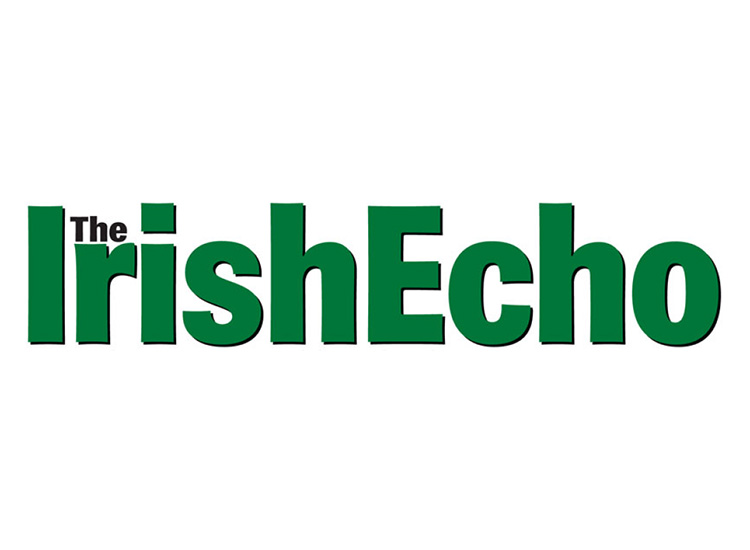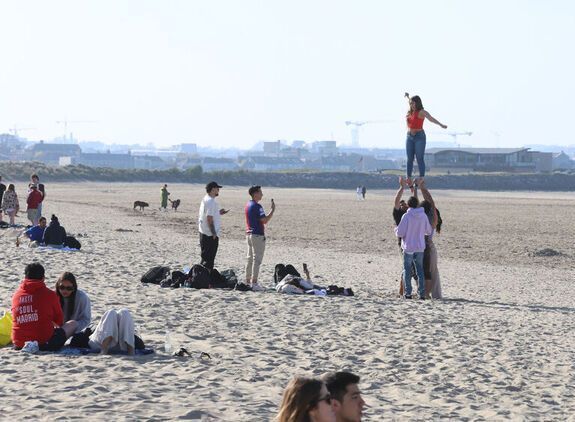By Ray O’Hanlon & Scott Jamison
Nov. 17-23, 2010
Taoiseach Brian Cowen drew a line in the sand Tuesday insisting that Ireland did not need to be bailed out by the European Union and International Monetary Fund, this as world markets grew increasingly nervous in the face of Ireland’s debt, the rising cost of paying for it, and the effect that it is having on the value of the euro.
Cowen, speaking to the Dáil, said that Ireland’s debt was “fully funded” until the middle of next year. His defiant stance was just the latest in a series of such positions taken by him and finance minister Brian Lenihan.
But as Ireland’s economic woes continued to make headlines around the globe, there was a growing sense that Dublin will not be able to hold out against the wishes of EU partners, Germany in particular, and the global market-based community.
A figure of €80 billion as a “stabilizing” loan for the Republic was being mentioned in various reports.
As Cowen spoke in Dublin, Minister Lenihan was in Brussels meeting with counterparts from the 15-nation eurozone. Lenihan reiterated to reporters what Cowen was saying.
“Market developments have not been good to Ireland. Ireland is fully funded until the middle of next year,” he said.
Reports stated that Lenihan was intent on fending off pressure for a bailout that would be drawn up by the European Union, the International Monetary Fund or a combination of the two.
A bailout would likely be aimed most specifically at the struggling Irish banks, but given that the banks are now almost wholly owned by the government, it would effectively be for Ireland in total. As such, it would be a huge blow for the Republic as it would in effect be end for the foreseeable future to the country’s financial sovereignty.
“We are living in a very fragile time and we need to be careful about what we say so that we don’t add to the turbulence. Those that are now commenting on Ireland’s financial situation should also remember that the exchequer is fully funded into the first half of 2011, so the impending sense of crisis that some wish to suggest the Irish State faces is not a fair reflection of the facts,” Cowen told the Dáil as Lenihan flew to Brussels.
Cowen, however, seemed to acknowledge a broader picture, one beyond Ireland’s economic borders.
“Clearly there is a need to bring stability to markets, here and elsewhere, as the current costs of borrowing are very high and are at a level that would make it difficult for banks here to operate as engines of recovery,” he said.
The Irish government has been insisting that it is on track to restore the deficit to the Eurozone-mandated 3 percent of GDP by 2014, this process beginning with a budget set for December 7, but one that might now be pulled forward by a few days. The budget will include as much as €6 billion in spending cuts.
A defeat for the government on any budget financial motion in the Dáil would result in a general election.
“Let me reiterate what I have been saying in response to speculation over the last number of days that Ireland is seeking financial assistance: Ireland has made no application for external support,” Cowen insisted.
“It is in all of our interests that we find a credible, efficient and above all workable solution that will provide assurance to the markets and thereby restore confidence and stability,” he added.
He said that the turbulence in the markets over recent weeks had been about issues of wider concern than Ireland’s situation. This is the case as similar concerns have mounted with regard to the situation facing Greece and Portugal in particular.
And various reports, including one in the New York Times Tuesday, have painted Ireland in a favorable light compared to those two EU countries because of the evident willingness of the Irish government to acknowledge its problems and tackle them to the best of its ability.
But this alone might now be enough in the face of Ireland’s current deficit. It now stands at an astonishing 32 percent of gross domestic product, way above the 3 percent limit.
By Ray O’Hanlon& Scott Jamison
Taoiseach Brian Cowen drew a line in the sand Tuesday insisting that Ireland did not need to be bailed out by the European Union and International Monetary Fund, this as world markets grew increasingly nervous in the face of Ireland’s debt, the rising cost of paying for it, and the effect that it is having on the value of the euro.Cowen, speaking to the Dáil, said that Ireland’s debt was “fully funded” until the middle of next year. His defiant stance was just the latest in a series of such positions taken by him and finance minister Brian Lenihan.But as Ireland’s economic woes continued to make headlines around the globe, there was a growing sense that Dublin will not be able to hold out against the wishes of EU partners, Germany in particular, and the global market-based community. A figure of €80 billion as a “stabilizing” loan for the Republic was being mentioned in various reports.As Cowen spoke in Dublin, Minister Lenihan was in Brussels meeting with counterparts from the 15-nation eurozone. Lenihan reiterated to reporters what Cowen was saying.“Market developments have not been good to Ireland. Ireland is fully funded until the middle of next year,” he said.Reports stated that Lenihan was intent on fending off pressure for a bailout that would be drawn up by the European Union, the International Monetary Fund or a combination of the two. A bailout would likely be aimed most specifically at the struggling Irish banks, but given that the banks are now almost wholly owned by the government, it would effectively be for Ireland in total. As such, it would be a huge blow for the Republic as it would in effect be end for the foreseeable future to the country’s financial sovereignty.“We are living in a very fragile time and we need to be careful about what we say so that we don’t add to the turbulence. Those that are now commenting on Ireland’s financial situation should also remember that the exchequer is fully funded into the first half of 2011, so the impending sense of crisis that some wish to suggest the Irish State faces is not a fair reflection of the facts,” Cowen told the Dáil as Lenihan flew to Brussels.Cowen, however, seemed to acknowledge a broader picture, one beyond Ireland’s economic borders.See SIEGE, Page 2
“Clearly there is a need to bring stability to markets, here and elsewhere, as the current costs of borrowing are very high and are at a level that would make it difficult for banks here to operate as engines of recovery,” he said. The Irish government has been insisting that it is on track to restore the deficit to the Eurozone-mandated 3 percent of GDP by 2014, this process beginning with a budget set for December 7, but one that might now be pulled forward by a few days. The budget will include as much as €6 billion in spending cuts. A defeat for the government on any budget financial motion in the Dáil would result in a general election. “Let me reiterate what I have been saying in response to speculation over the last number of days that Ireland is seeking financial assistance: Ireland has made no application for external support,” Cowen insisted. “It is in all of our interests that we find a credible, efficient and above all workable solution that will provide assurance to the markets and thereby restore confidence and stability,” he added. He said that the turbulence in the markets over recent weeks had been about issues of wider concern than Ireland’s situation. This is the case as similar concerns have mounted with regard to the situation facing Greece and Portugal in particular. And various reports, including one in the New York Times Tuesday, have painted Ireland in a favorable light compared to those two EU countries because of the evident willingness of the Irish government to acknowledge its problems and tackle them to the best of its ability. But this alone might now be enough in the face of Ireland’s current deficit. It now stands at an astonishing 32 percent of gross domestic product, way above the 3 percent limit.
Sign up to The Irish Echo Newsletter
Sign up today to get daily, up-to-date news and views from Irish America.










